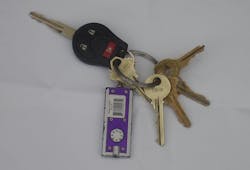During my very early childhood our family owned an egg business. Our slogan was "best of the nest." My father would travel to Wisconsin farm country and pick up the eggs, then he would deliver them to grocery stores in the Chicago area. Before delivery, the eggs had to be 'candled'. Each egg was held in front of a light source which allowed us to see if there were any dark spots inside each egg. Extra large or spotted eggs were set aside. The result was that every week thousands of eggs with the same shape, size and color were packed into cartons and delivered to grocery stores.
I was reminded of the egg business last week when one of our writers discovered an internet site which showed a new automated key machine. The key machine has now been found at several different big box stores around the country. The machine allows the public to make their own duplicate keys. The original key is laid on a glass shelf to begin the process. Cameras within the machine can apparently scan the blade and cut surfaces on the original key. The machine then chooses the correct blank and makes the required cuts on a new blank. Users can choose either standard key blanks or decorative key blanks for their duplicate. Charges for each duplicate key is $2.99 or higher depending on whether a decorative or standard key blank is chosen. The keys shown in the demonstration video have a KW1 keyway.
The comparison to the egg business is that all of the keys types presently cut by this machine apparently has a few key blanks all with the same small amount of similar keyways. This automated machine only has to be ready to cut two different types of key blanks and it can fill the needs of 50 percent of the key duplication market. You can view the machine at: www.minutekey.com. The website also displays a logo showing that they are associate members of ALOA.
If there is a bright side to this story, it is that there are 5,000 other blanks such as sectional keys and automotive keys which this machine does not presently duplicate. Since KW1 and SC1 blanks are so popular, volume manufacturing keeps the cost of these key blanks rather low. Prices for other aftermarket key blanks can vary widely. As example, one Kaba Ilco key blank catalog lists over 50 different price groups for their blanks.
If the automated key duplicator is successful, the majority of your requests for duplicates will be for higher cost key blanks. This means an increased investment in key blank inventory. It also means that locksmiths must keep a keen eye on individual key blank expenses and what the customer charge should be for each key blank price group. If the automated machine base charge is $2.99 for a KW1 or SC1 duplicate key, you can draw your own conclusions when charging for duplicate keys in the higher cost key blank groups.
Almost every lock manufacturer has jumped on the KW1/SC1 bandwagon by making locks with either of these keyways. All possible KW1 or SC1 5-cut key combinations number only in the thousands. With locks being manufactured in the millions each year, the possibility of key interchanges does exist. In another era there was Reading, Clinton, Sager, and many other lock companies each with their own unique keyways. This kept pin tumbler security within reason and maintained the locksmith as an important cog in the security framework. Now we have two dominant keyways and I do not see this as an improvement. If for no other reason, it gives opportunists such as this automated key machine company the chance to make an automated machine for duplicating just a few keyways while taking away 50% of our key duplication business.
.
.
About the Author

